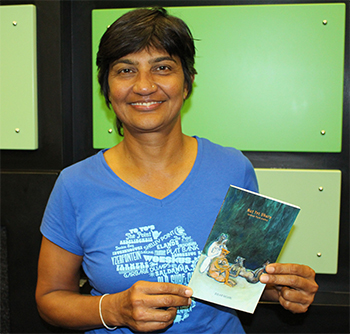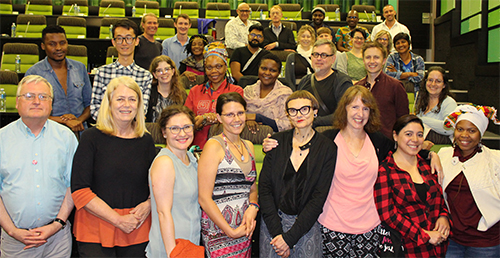
The African college of excellence in the social and human sciences
To encourage academic engagement with intersection between queer theory and the lived experience of queer people in the South, the Institution for Gender Studies in the College of Human Sciences hosted a Lectures conference in February which has been designated LGBTQIA History month. The programme featured panel discussions on contemporary/new queer writing in South Africa, as well as papers that consider the intersection between queer theory and narratives of colonial history, the actualities of postcolonial life, and the current drive towards decoloniality. The conference keynote speakers, Louise Viljoen, Professor Bill Marshall, Professor Taiwo Adetunji Osinubi, and Gabriel Khan, led the sessions with their moving talks, which set the tone for the rest of the session speakers.
 The film Inxeba (The wound) which received backlash and caused controversy in the country took centre stage on the first day of the conference. Alfred Moraka, from the University of Pretoria emphasised on the film's reductive use of African cultural praxis of male initiation as the backdrop for the showcasing of the politics of queer identity and heterosexual masculinity. The film constituted a cinematic projection, of not just the African body as backdrop for western gender inscription but also of the colonial writing of western epistemologies onto African cultural life, in this way Inxeba is settler colonialism animated as cinema. “To wound, to inflict a wound on, to carry a wound.”
The film Inxeba (The wound) which received backlash and caused controversy in the country took centre stage on the first day of the conference. Alfred Moraka, from the University of Pretoria emphasised on the film's reductive use of African cultural praxis of male initiation as the backdrop for the showcasing of the politics of queer identity and heterosexual masculinity. The film constituted a cinematic projection, of not just the African body as backdrop for western gender inscription but also of the colonial writing of western epistemologies onto African cultural life, in this way Inxeba is settler colonialism animated as cinema. “To wound, to inflict a wound on, to carry a wound.”
Dr Chantelle Gray van Heerden provoked further thoughts on how cinema can be used as a territory or assemblage of desire to provoke intensities that encourage an ethics of permanent revolution. Her questions were based on how queer cinesexuals hold the wound at bay, or move against it wound to wound.
Professor Osinubi from the University of Western Ontario spoke on the narrative of care and South African queer exceptionalism focusing on Inxeba and a man who is not a man.
“In the Anti-Oedipus the (individual, human) subject is an effect of productive desire, not lack of repression”, said Professor Mashall, adding that in capatilism, the Oedipus complex marks the disjunction in the connecting flows of desire, assigning us all to fixed and docile units governed by the phallus as it distributes the flows according to the either/ or of gender, of having it or not having it, and this binds us to a structuring based on infantile family relationships. He stated that it is the power of telling stories, which puts the truth of colonial domination; homosexuals will have to pay for their new recognition.
Dr Christo Cilliers highlighted the lack of media coverage on hate crimes and how the media coverage around those crimes are at a bare minimum. These crimes are not shown to world even though they hold the same weight as heterosexual crimes. He further displayed examples of various horrible crimes, which most have no knowledge of. The media plays a vital role in making the society aware of these vicious killings and rape, but instead they shy away from them as if they do not exist. “Media representations provide clues about who belongs in a society, which groups are to be degraded, and what approvals are acceptable for stigmatised groups.”
The conference incorporated a book reading by Silindiwe Sibanda from the book Not Yet Uhuru by Dolar Vasani. Not Yet Uhuru is a lesbian flash fiction; Uhuru is a Swahili word meaning freedom. The 12 illustrated stories are spread over 12 months and address a wide range of issues and struggles. Set in Kenya, Malawi, South Africa, Tanzania, Uganda, the UK, Zambia and Zimbabwe, these tales are about girls, women, daughters, sisters, mothers and grandmothers finding out, coming out, being out and staying out. The central character of each story is of South Asian descent and every story has an erotic twist, supported by a unique black and white illustration, done by Andrea Rolfes

*By Nomshado Lubisi (CHS communication and marketing)
Publish date: 2018-03-14 00:00:00.0